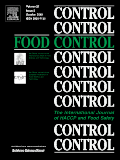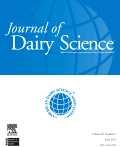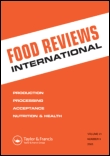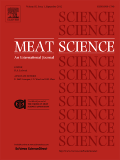
FLEISCHWIRTSCHAFT
Scope & Guideline
Driving knowledge in the evolving meat sector.
Introduction
Aims and Scopes
- Quality Assurance and Food Safety:
Research on methodologies and technologies to ensure food safety and quality in meat production, including regulatory compliance and consumer protection. - Animal Welfare and Ethical Practices:
Exploration of animal welfare standards and practices within the meat industry, focusing on humane treatment, ethical slaughtering techniques, and consumer attitudes towards animal welfare. - Innovations in Meat Processing Technology:
Investigation of new technologies and processes that enhance the efficiency and sustainability of meat processing, including automation, robotics, and sustainable packaging. - Consumer Trends and Market Dynamics:
Analysis of consumer preferences, trends in meat consumption, and the impact of socio-economic factors on the meat industry, including shifts towards plant-based alternatives. - Sustainability and Environmental Impact:
Studies addressing the environmental footprint of meat production, including resource management, waste reduction, and strategies for sustainable practices. - Global Meat Trade and Economics:
Insights into the dynamics of the global meat market, trade regulations, export-import patterns, and economic implications for meat producers.
Trending and Emerging
- Plant-Based and Alternative Proteins:
A growing body of research focuses on plant-based alternatives and hybrid products, indicating a shift in consumer preferences towards healthier and more sustainable options. - Digitalization and Automation in Meat Processing:
The integration of digital technologies and automation within meat processing facilities is gaining traction, enhancing efficiency and safety in production. - Sustainable Practices and Environmental Responsibility:
There is an increasing emphasis on sustainability initiatives, including waste reduction, carbon footprint minimization, and sustainable sourcing of materials. - Consumer Health and Nutrition:
Heightened consumer awareness of health and nutrition is driving research on the nutritional value of meat products and the impact of dietary choices on health. - Global Trade Dynamics and Supply Chain Resilience:
Emerging discussions focus on the complexities of global meat trade, trade regulations, and the need for resilient supply chains in the face of global disruptions.
Declining or Waning
- Traditional Meat Production Techniques:
There is a noticeable decrease in articles focusing on conventional meat production methods as the industry shifts towards automation and alternative protein sources. - High Consumption of Red Meat:
Research and discussions surrounding the consumption of red meat are diminishing, likely influenced by increasing health concerns and a growing trend towards plant-based diets. - Animal Husbandry Practices:
Coverage of traditional animal husbandry practices is declining, as the focus shifts towards more modern, sustainable, and ethical approaches to livestock management. - Regional Specificity in Meat Production:
Studies that focus on specific regional practices in meat production are becoming less frequent, possibly due to the globalization of meat markets and standardization of practices. - Meat as a Cultural Tradition:
Less emphasis is placed on the cultural significance of meat in culinary traditions as discussions increasingly pivot towards health, sustainability, and alternative proteins.
Similar Journals

FOOD CONTROL
Transforming food control for a safer tomorrow.FOOD CONTROL, published by Elsevier Science Ltd, stands at the forefront of research in the fields of Food Science and Biotechnology, holding a prestigious Q1 ranking in both categories as of 2023. With an impact factor reflecting its influential role in the scientific community, this journal is dedicated to advancing the understanding and control of food safety, quality, and regulations from 1990 to its projected convergence in 2025. Food Control provides a platform for innovative research and critical reviews that address the pressing global challenges in food safety, sustainability, and technological advancements in the industry. Researchers, professionals, and students are encouraged to engage with its content, fostering a deeper understanding of the intersection between food science and biotechnological advancements, all while benefiting from the extensive reach of its Scopus rankings, which place it in the top 5th percentile of its respective fields.

JOURNAL OF DAIRY SCIENCE
Transforming Dairy Science with Impactful FindingsThe JOURNAL OF DAIRY SCIENCE, published by Elsevier Science Inc., stands as a premier outlet for scholarly research in the fields of Animal Science, Food Science, and Genetics. With an impressive legacy dating back to 1917, this esteemed journal continues to contribute significantly to the advancement of dairy science and related disciplines, boasting a remarkable Q1 status across its categories as of 2023. In the realm of Agricultural and Biological Sciences, it ranks 15th out of 490 in Animal Science and Zoology, indicating a strong influence and recognition in the field. Researchers and professionals worldwide rely on this journal for the latest findings, innovative techniques, and comprehensive reviews, making it an essential resource for advancing knowledge and practices within the dairy sector. While the journal maintains a subscription-based access model, its rich content remains unparalleled in guiding future research and fostering collaborative advancements. Its enduring commitment to quality sets a high standard for publication, reinforcing its invaluable position in the scientific community.

FOOD REVIEWS INTERNATIONAL
Championing Comprehensive Reviews in Food ScienceFOOD REVIEWS INTERNATIONAL, published by Taylor & Francis Inc, serves as a pivotal resource within the fields of Food Science and Chemical Engineering. Established in 1985, this esteemed journal offers a comprehensive platform for the dissemination of critical reviews that enhance understanding and innovation in the food industry. With an impressive impact factor reflecting its Q1 quartiles in both Food Science and Chemical Engineering categories, it ranks among the top journals in Scopus, securing the 24th spot in Agricultural and Biological Sciences. Scholars, researchers, and professionals are encouraged to explore its rich content, which spans meticulously reviewed articles that bridge academic research and practical applications, while contributing to advancements in food safety, processing, and sustainability. Although not an Open Access journal, access to its extensive repository is vital for anyone aiming to stay at the forefront of food science advancements.

Journal of Insects as Food and Feed
Innovating food systems through entomophagy research.The Journal of Insects as Food and Feed, published by Wageningen Academic Publishers, serves as a pivotal platform for advancing research in the innovative and rapidly growing field of entomophagy and insect-based feed. Since its inception in 2015, this journal has maintained a strong impact, as evidenced by its impressive Q1 ranking in both Food Science and Insect Science categories, as well as its commendable Scopus rankings—holding the 15th position among 181 in Insect Science and the 73rd among 389 in Food Science. With an inclusive scope embracing the numerous facets of insect utilization for food and nutrition, the journal aims to foster knowledge exchange and collaboration among researchers, professionals, and students alike. The journal’s commitment to excellence is further highlighted by its open access options, enabling a broader dissemination of groundbreaking findings essential for sustainable food systems. Situated in the vibrant research landscape of the Netherlands, the Journal of Insects as Food and Feed is an indispensable resource for anyone looking to delve into the future of food production and sustainable practices.

Animal Bioscience
Pioneering Research in Animal Nutrition and GeneticsAnimal Bioscience is a premier journal dedicated to advancing the field of animal science, published by the esteemed ASIAN-AUSTRALASIAN ASSOCIATION OF ANIMAL PRODUCTION SOCIETY. With an impactful presence in South Korea, this journal serves as a pivotal platform for disseminating high-quality research in animal production, nutrition, genetics, and veterinary sciences. Its notable standing is reflected in its categorization within the Q1 quartile for Animal Science and Zoology and Veterinary (miscellaneous) disciplines, highlighting the journal's dedication to excellence and relevance. Additionally, Animal Bioscience has secured impressive rankings in various related fields, with a 94th percentile position in general veterinary studies. As an Open Access publication, it encourages broad distribution and engagement with its content, making significant contributions to the global discourse surrounding animal technology and welfare. This journal is an invaluable resource for researchers, professionals, and students aiming to deepen their understanding and promote innovations in animal biosciences.

Ukrainian Food Journal
Nurturing a community dedicated to food innovation.Ukrainian Food Journal is an esteemed open-access journal dedicated to advancing the field of food science and biochemistry. Established in 2012 and published by the National University of Food Technologies in Ukraine, the journal serves as a vital platform for researchers and professionals to disseminate their findings on food technology, safety, and nutritional biochemistry. With an ISSN of 2304-974X and E-ISSN 2313-5891, it offers a wealth of knowledge to its readers, promoting innovation and collaboration within the industry. While currently categorized within the Q4 quartile of biochemistry and the Q3 quartile of food science, the journal is progressively gaining recognition, reflecting a commitment to quality research in a competitive field. The journal is indexed in Scopus, ranking #271 in Food Science and #376 in Biochemistry, underscoring its relevance and contribution to agricultural and biological sciences. The Ukrainian Food Journal not only enriches the academic community with its open-access model but also aims to foster dialogue among researchers, professionals, and students dedicated to improving food systems and nutrition. It operates from its headquarters in Kyiv, offering a hub for creativity and advancement in food-related research.

Poultry Science Journal
Exploring the frontiers of animal science and food production.Poultry Science Journal, with the ISSN 2345-6604 and E-ISSN 2345-6566, is an esteemed publication spearheaded by Gorgan University of Agricultural Sciences & Natural Resources since its transition to Open Access in 2013. Based in Iran, this journal serves as a vital platform for disseminating cutting-edge research and innovative advancements in the fields of Animal Science and Food Animals. With a current impact reflected in its Q3 quartile ranking within its categories and Scopus ranks indicating a competitive standing among peers, the journal plays a crucial role in enhancing the academic discourse surrounding poultry science. Researchers, professionals, and students alike are encouraged to engage with the journal’s high-quality content, which encompasses diverse topics including poultry genetics, nutrition, health, and welfare, thereby contributing to the improvement of poultry production practices globally. The journal’s commitment to accessibility ensures that valuable findings are readily available to the scientific community, fostering collaboration and advancing research in this essential domain of agricultural science.

MEAT SCIENCE
Elevating Standards in Meat Quality and TechnologyMEAT SCIENCE is a premier peer-reviewed journal dedicated to the exploration of the science of meat and meat products, contributing significantly to the fields of food science and technology. Published by Elsevier Science Ltd, this esteemed journal has been in circulation since 1977 and is recognized for its rigorous standards and impactful research, as evidenced by its Q1 category ranking in Food Science for 2023 and a notable 96th percentile ranking in Agricultural and Biological Sciences. The journal fosters innovative discussions and dissemination of cutting-edge research, covering a diverse range of topics including meat quality, safety, technology, and consumer preferences. With no open access options, MEAT SCIENCE caters to a dedicated audience of researchers, professionals, and students, serving as a vital resource for advancing knowledge and practices within the global meat industry. By continually pushing the boundaries of meat science, this journal plays a crucial role in shaping future research and industry standards.

Current Research in Food Science
Leading the Charge in Food Science AdvancementsCurrent Research in Food Science is a leading peer-reviewed academic journal published by Elsevier, specializing in the dynamic field of food science. Since its transition to an Open Access model in 2019, the journal has broadened its reach, contributing significantly to the dissemination of high-quality research. With strong rankings, including a Q1 quartile status in Applied Microbiology and Biotechnology, Biotechnology, and Food Science, it stands out as a pivotal resource for scholars. Based in the Netherlands, current research published within its pages spans a wide range of relevant topics, ensuring that researchers and practitioners stay abreast of the latest advancements. The journal's impressive Scopus rankings enhance its credibility, with a percentile standing in the 74th to 83rd range across relevant categories, underscoring its impact and importance in the academic community. Current Research in Food Science aims to foster the exchange of innovative ideas and foster collaborative efforts among researchers, making it an essential resource for those engaged in advancing the science and technology of food.

FOOD TECHNOLOGY
Unveiling Trends in Food Science and EngineeringFOOD TECHNOLOGY, published by the Institute of Food Technologists, is a pivotal journal dedicated to the advancement of knowledge and innovation in the food industry. With its ISSN 0015-6639, this esteemed publication aims to bridge the gap between food science research and practical applications, addressing ongoing challenges and technological advancements in food production, preservation, and safety. Although currently not an open-access journal, FOOD TECHNOLOGY continues to serve as a critical resource for food scientists, engineers, and industry professionals seeking to stay at the forefront of emerging trends and research in the field. Recognized for its impact within the academic community, it holds a Q4 ranking in Chemistry, Food Science, and Industrial and Manufacturing Engineering categories, reflecting its importance in disseminating valuable information. Researchers and practitioners alike will find in its pages a wealth of insights that can influence practices and policies in food technology. The journal's editorial team, committed to upholding rigorous standards, ensures that each issue is a thorough representation of high-quality research and a valuable addition to the body of food science literature.